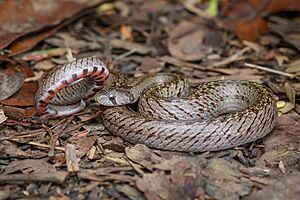Oligodon deuvei facts for kids
Quick facts for kids Oligodon deuvei |
|
|---|---|
 |
|
| Conservation status | |
| Scientific classification | |
| Genus: |
Oligodon
|
| Species: |
deuvei
|
The Oligodon deuvei is a type of snake, also known as Deuve's kukri snake. It belongs to the family Colubridae, which is a very large group of snakes. This snake is special because it is endemic to Southeast Asia, meaning it's only found naturally in that part of the world.
Contents
What's in a Name? The deuvei Story
The special part of its name, deuvei, was chosen to honor a French military officer and nature lover named Jean Deuve (1918–2008). He was an amateur naturalist who loved studying nature.
Where Does This Snake Live?
You can find the O. deuvei snake in several countries in Southeast Asia. It lives in Cambodia, southern Vietnam, and Laos. Scientists also believe it might live in northeastern Thailand.
Home Sweet Home: The Snake's Habitat
This snake usually prefers to live in forests. However, it's quite adaptable and can sometimes be found in gardens too!
What Does the O. deuvei Look Like?
The O. deuvei snake has some unique features that help tell it apart from other snakes in its group. It has between 12 and 15 teeth in its upper jaw. It also has 17 rows of dorsal scales (scales on its back) around the middle of its body.
This snake usually has about seven scales around its upper lip. A cool thing about its appearance is that it doesn't have any blotches or spots on its back or tail. Instead, it has a single black stripe running down its back, which is often orange or red.
It looks quite similar to another snake called O. barroni. But the O. deuvei has more teeth in its upper jaw and, as mentioned, it doesn't have those dorsal or tail marks that O. barroni might have.
How Does This Snake Behave?
The O. deuvei snake is a very active creature! It is terrestrial, meaning it spends most of its time on the ground. It's also semiaquatic, so it can spend some time in or near water.
This snake is both crepuscular and diurnal. This means it is active during the day, but also especially active during twilight hours, like dawn and dusk.
What Does the O. deuvei Eat?
The O. deuvei snake is a predator. It mainly eats frogs and their young, which are called tadpoles.
Reproduction and Life Cycle
Scientists are still learning about the O. deuvei snake. The exact way it reproduces is not yet known.


